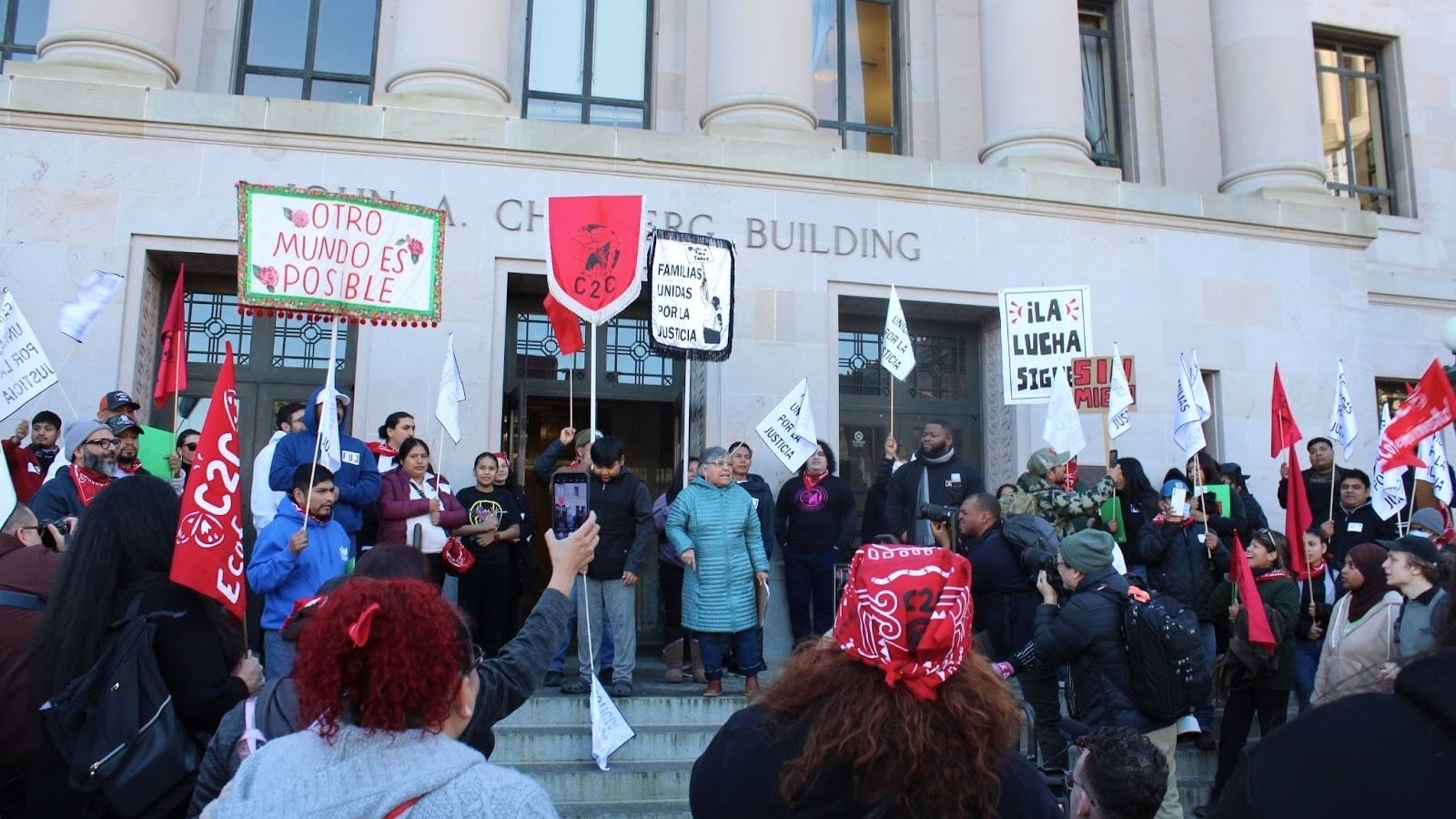Hoarfrost still coated the Capitol lawn in Olympia, Washington, as Alfredo Juarez led 16 farmworkers across the grounds to the first of three meetings with lawmakers from the state’s 40th legislative district. The cadre marshaled by Juarez, the campaigns director for the farmworkers union Familias Unidas por la Justicia, was 1 of 5 making rounds, lobbying policymakers, and inviting them to a people’s tribunal that the union and a partner organization were hosting that afternoon.
For the last 12 years, Familias Unidas and Community to Community Development, an ecofeminist nonprofit that supports farmworkers, have convened a tribunal where farmworkers share the injustices and indignities they face and advocate for policies to improve the well-being of their families and communities. These tribunals started as small affairs that seemed to make little impact on the business occurring at the Capitol, but over the years their influence has grown, and organizers have notched tangible policy victories and gained sway with elected officials.
This year, the convening came one day after President Donald Trump returned to the White House to lead an administration that has shown hostility to the Latino and immigrant communities that do the bulk of the nation’s farmwork. Familias Unidas and Community to Community hope the tribunal can advance policies that protect the people doing this essential labor, even as climate change makes their jobs more hazardous.
Rosalinda Guillen, the founder of Community to Community, or C2C, has been an organizer since the 1980s. She has long believed in the importance of participatory democracy, and has convened all kinds of assemblies to bring people together to discuss problems, imagine solutions, and develop strategies to advance them. But as Guillen and her colleagues in C2C continued to reckon with the fact that policymakers were writing laws without engaging affected populations in a meaningful way, they realized that if they wanted to be heard, they’d have to make the hike to Capitol Hill.
Their people’s court has no legal standing. They are overseen not by judges but by women with a track record of trust and leadership in marginalized communities. Their role is to hear testimony, compile a report detailing common and recurring themes, and outline the policies and regulations required to address them.
Past tribunals have helped win guaranteed overtime pay for farmworkers, which the legislature passed in 2021 with support from labor unions and others. They’ve helped press the state Department of Labor and Industries to adopt permanent heat protections that took effect in June 2023, mandating cooling breaks when temperatures top 90 degrees. The tribunal was also instrumental in the creation of the Agricultural and Seasonal Workforce Service Advisory Committee, which provides additional oversight and protection for the state’s seasonal farmworker program.
These accomplishments highlight the effort’s growing political influence and provide a model for organizers beyond Washington. “The tribunal used to be just us in a tiny room,” said Familias Unidas’ political director, Edgar Franks. “And now it’s filled to capacity. We need overflow rooms. And legislators and senators show up. They want to be there and listen and participate.”
This year, at least 60 farmworkers filled the chairs on one side of the hearing room, while some 70 allies and supporters sat in chairs, knelt on the floor, and stood along the walls on the other. Another 40 or so gathered in a nearby church to watch the proceedings on Zoom. Half a dozen legislative staffers attended, listening and taking notes, but state Senator Liz Lovelett, who represents the district where C2C and Familias Unidas are based, was the only lawmaker to attend.
Lovelett has attended four tribunals in the six years she’s been in the senate. Not only does attending them help build trust and credibility with farmworkers, it also helps ensure she can explain to colleagues what these workers are experiencing to “try to underscore the importance of any particular policy,” she said. On a human level, she finds the testimonies powerful. “Can you think of another group of workers that has to ask for things like shade and bathrooms and basic dignity?” Lovelett asked.
Alfredo Juarez’s 14-year-old sister, Alia, skipped school to testify to how this nation’s system of farm labor — a system that Guillen often reminds people is rooted in slavery — impacts her family. With a weary voice, Alia spoke about how, as the eldest daughter still at home, she has to cook and clean and care for her siblings while her parents work long hours for wages that barely support their family. That burden means she struggles to keep up with school, and her youngest sister has taken to calling her “mom.” So what Alia wants is for her parents’ income to reflect how hard they work, so they can spend more time at home.
But beyond the recurring themes of wages and hours, a major point of concern throughout the day was the rising threat of deportation. The state’s Republicans have introduced a bill that would reverse the state law barring police from supporting federal immigration enforcement; the bill would also prohibit cities from adopting policies that create sanctuaries for undocumented people. Throughout their lobbying meetings, the farmworkers called on legislators to vote against it.
In one meeting, Representative Alex Ramel, a Democrat, promised Juarez and his group that the bill had no chance of passing. (Democrats hold a majority in both houses of the legislature.) Juarez translated the assurance into Spanish and Mixteco for the workers around him, and many seemed relieved. As the meeting continued and subjects like rent stabilization and universal health care came up, Ramel said the tribunal and similar gatherings are key to enacting such policies because they demonstrate support and hold officials accountable to their constituents’ demands.
Still, despite the tribunal’s growing influence, Washington is the only state to regularly hold one. But Familias Unidas, which is 1 of just 2 farmworkers’ unions in the country, and C2C supported a binational farmworkers tribunal, hosted by the Food Chain Workers Alliance, in New York last March. It brought together dozens of workers in person and online who work in Canada and the U.S., but come from throughout Latin America and the Caribbean, to discuss their shared struggles and how to resolve them.
Guillen attributes the dearth of tribunals to the fact that most states lack farmworkers’ unions and the supporting organizations required to marshal the time, energy, and effort to bring something like this together. People also have to trust the organizers. Guillen and C2C have spent over 20 years building that trust so that people know that C2C will always be there to serve them. The tribunal is just one of the tools they use to do that.
Most people’s tribunals, however, occur as one-off affairs that only resurface if some gross injustice has taken place. But for Guillen, C2C, and Familias Unidas, they have made a commitment to support farmworkers through these forums and others until the workers themselves feel like justice has been delivered. “It’s their vision, it’s their goal, and we’re supporting it to the end,” Guillen said.
“No matter what the political environment, no matter what happens, we’re moving forward together.”
Source link
Syris Valentine grist.org



